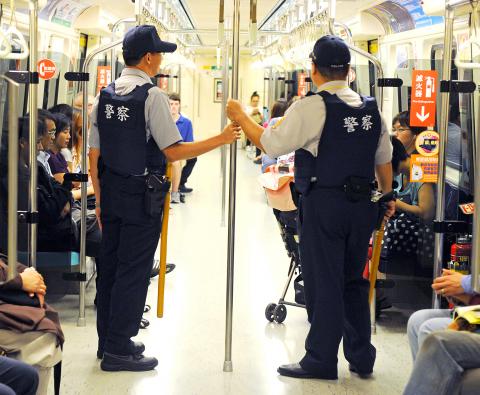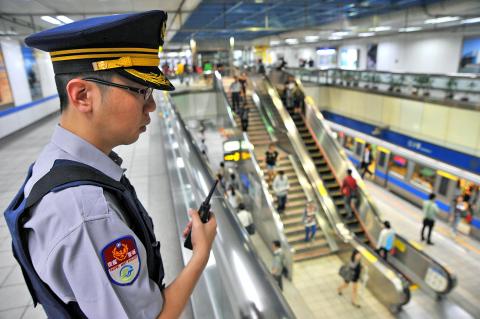Premier Jiang Yi-huah (江宜樺) yesterday vowed to address all the concerns over public security highlighted by the random slaying spree on a train of the Taipei MRT system’s Bannan Line on Wednesday as he called for enhanced security at public venues and on public transportation networks.
Among the concerns was the shortage of police manpower voiced by Taipei Deputy Mayor Timothy Ting (丁庭宇) when Jiang was briefed yesterday by Cabinet members with the Ministry of the Interior, the Ministry of Transportation and Communications and the Ministry of Education about proposed measures to prevent similar attacks.
Ting requested at the meeting that the National Police Agency (NPA) deploy more police officers to the city to assist with security, while Directorate-General of Personnel Administration Minister Frank Huang (黃富源) said that the shortage of police is a problem facing every city and county, Executive Yuan spokesperson Sun Lih-chyun (孫立群) said.

Photo: CNA
Huang put the nationwide shortage of police at 7,000 officers, Sun said.
Jiang also demanded that the police and prosecutorial authority determine the motive of the alleged killer at the earliest possible time and punish him, Sun said.
In the wake of the MRT killings, Taipei Mayor Hau Lung-bin (郝龍斌) said yesterday that the city government has proposed raising the quota of police stationed in the MRT from the current 160 to at least 240.

Photo: AFP
Hau told a press conference that the National Police Agency has agreed to lend support to the city in the short term by dispatching 80 special police to reinforce patrols on trains and at stations in the next two weeks.
He added that the city government would ask the central government to expand the MRT police quota, with 80 as the baseline.
Having taken the MRT to work yesterday morning, Hau said that many passengers told him that they are afraid that something similar might happen again and suggested that trains be equipped with self-defense equipment in case of emergencies. The mayor said the suggestion would be carefully assessed and considered.
Hau added that counterterrorism drills would be conducted in the MRT to prepare the system for any possible incident.
Meanwhile, Taipei Rapid Transit Corp (台北捷運公司) general manager Tan Gwa-guang (譚國光) rebuffed an allegation that there were delays in reporting and reaction on the part of the corporation during the incident.
Tan said that after the carriage’s emergency communication button was pressed, the train operator immediately informed the traffic control center, which then informed the station chief and security guards at Jiangzicui Station before the train pulled into the station.
The center again contacted the district police after the train arrived.
According to the general manager, the first district police arrived within five minutes after the report.

A Ministry of Foreign Affairs official yesterday said that a delegation that visited China for an APEC meeting did not receive any kind of treatment that downgraded Taiwan’s sovereignty. Department of International Organizations Director-General Jonathan Sun (孫儉元) said that he and a group of ministry officials visited Shenzhen, China, to attend the APEC Informal Senior Officials’ Meeting last month. The trip went “smoothly and safely” for all Taiwanese delegates, as the Chinese side arranged the trip in accordance with long-standing practices, Sun said at the ministry’s weekly briefing. The Taiwanese group did not encounter any political suppression, he said. Sun made the remarks when

The Taiwanese passport ranked 33rd in a global listing of passports by convenience this month, rising three places from last month’s ranking, but matching its position in January last year. The Henley Passport Index, an international ranking of passports by the number of designations its holder can travel to without a visa, showed that the Taiwan passport enables holders to travel to 139 countries and territories without a visa. Singapore’s passport was ranked the most powerful with visa-free access to 192 destinations out of 227, according to the index published on Tuesday by UK-based migration investment consultancy firm Henley and Partners. Japan’s and

BROAD AGREEMENT: The two are nearing a trade deal to reduce Taiwan’s tariff to 15% and a commitment for TSMC to build five more fabs, a ‘New York Times’ report said Taiwan and the US have reached a broad consensus on a trade deal, the Executive Yuan’s Office of Trade Negotiations said yesterday, after a report said that Washington is set to reduce Taiwan’s tariff rate to 15 percent. The New York Times on Monday reported that the two nations are nearing a trade deal to reduce Taiwan’s tariff rate to 15 percent and commit Taiwan Semiconductor Manufacturing Co (TSMC, 台積電) to building at least five more facilities in the US. “The agreement, which has been under negotiation for months, is being legally scrubbed and could be announced this month,” the paper said,

Japan and the Philippines yesterday signed a defense pact that would allow the tax-free provision of ammunition, fuel, food and other necessities when their forces stage joint training to boost deterrence against China’s growing aggression in the region and to bolster their preparation for natural disasters. Japan has faced increasing political, trade and security tensions with China, which was angered by Japanese Prime Minister Sanae Takaichi’s remark that a Chinese attack on Taiwan would be a survival-threatening situation for Japan, triggering a military response. Japan and the Philippines have also had separate territorial conflicts with Beijing in the East and South China